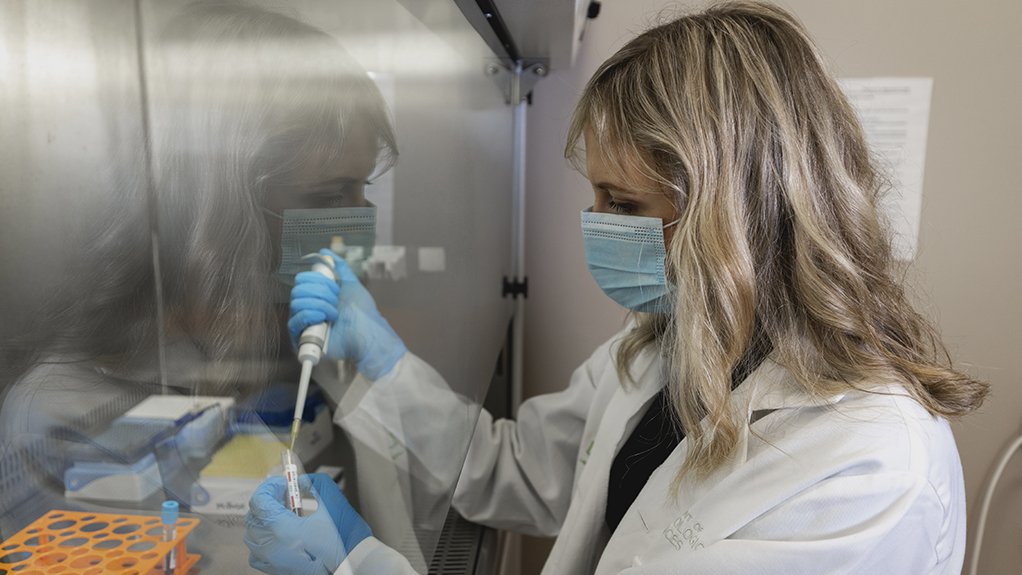Disease risk screening tool to be launched by Stellenbosch University startup BioCODE end-2022
A locally manufactured rapid test that detects the inflammatory molecule Serum Amyloid A (SAA) in a drop of blood is scheduled to be launched at the end of next year by developer, Stellenbosch University (SU) startup, BioCODE.
Aiming to empower people to take charge of their own health, anyone will be able to perform the rapid test for SAA, with results available in minutes.
“SAA and other inflammatory molecules increase when a person has inflammation. Cardiovascular disease, Type-2 diabetes, psoriasis, rheumatoid arthritis, acute Covid and even pheno-type long Covid have increased inflammatory molecules like SAA in circulation. These inflammatory molecules cause blood to become sticky, resulting in a heart attack, deep vein thrombosis or even a stroke,” explains SU physiology department head and BioCODE MD professor Resia Pretorius.
BioCODE stems from research collaborations between the SU physiology and engineering departments and started development of the rapid test at the beginning of 2020.
The physiology research group has been researching SAA and its role in inflammatory conditions for the past five years and has found that the molecule has great diagnostic value for monitoring inflammation and inflammatory conditions.
This inspired the development of an easy and affordable rapid test that can detect and monitor inflammation.
However, identifying a commercially-viable detection method that is affordable and accessible was challenging, says BioCODE operations and product development lead Este Burger,
“We screened various detection mechanisms according to these criteria before we decided on our final design. We also worked hard to secure Series A funding for the commercial development of the rapid test,” she explains.
Notably, BioCODE has recently received a R7-million cash injection to fund the development of its rapid test.
A contribution of R5-million marks the second investment in BioCODE by the University Technology Fund (UTF), a venture fund specifically focused on commercialising technology, intellectual property and research originating from South African universities. The remaining R2-million was contributed by SU as part of its partnership with the fund.
The blood of many control and inflammatory patients has been collected and analysed by BioCODE and these data sets are used to set the appropriate specifications for the rapid tests.
The rapid test consists of a small cassette that takes a finger-prick blood sample and, together with a mobile reader application that scans the results, it quantifies the concentration of SAA in the blood.
The results are integrated with BioCODE’s Internet of Things platform that provides an interface to monitor patient results.
Some components for the test are manufactured locally, while some reagents and materials are imported.
BioCODE plans to make the test available through healthcare and wellness service providers, such as clinicians, occupational health service providers and precision medicine companies.
“We also plan to collaborate with medical aid companies, since our product can serve as a disease-risk screening and monitoring tool,” says Pretorius, adding that BioCODE is also exploring the use of the rapid test in the sports industry as a tool to monitor over-training.
The rapid test is expected to be the first of many disease risk screening tools developed by BioCODE, which aims to lead the biotech movement in South Africa towards accessible preventative health care.
"The future of medicine will primarily rely on prevention rather than cures. BioCODE is at the forefront of preventative medicine making it an investment with global potential," says Wayne Stocks, partner at investment holding company Stocks & Strauss, the appointed fund managers of the UTF, in a media release.
BioCODE also started developing a lab management software platform for research and pathology laboratories in April this year. This platform is specifically designed to help Covid PCR labs track their test-activities, stock, overall testing and consumable use efficiency.
Article Enquiry
Email Article
Save Article
Feedback
To advertise email advertising@creamermedia.co.za or click here
Press Office
Announcements
What's On
Subscribe to improve your user experience...
Option 1 (equivalent of R125 a month):
Receive a weekly copy of Creamer Media's Engineering News & Mining Weekly magazine
(print copy for those in South Africa and e-magazine for those outside of South Africa)
Receive daily email newsletters
Access to full search results
Access archive of magazine back copies
Access to Projects in Progress
Access to ONE Research Report of your choice in PDF format
Option 2 (equivalent of R375 a month):
All benefits from Option 1
PLUS
Access to Creamer Media's Research Channel Africa for ALL Research Reports, in PDF format, on various industrial and mining sectors
including Electricity; Water; Energy Transition; Hydrogen; Roads, Rail and Ports; Coal; Gold; Platinum; Battery Metals; etc.
Already a subscriber?
Forgotten your password?
Receive weekly copy of Creamer Media's Engineering News & Mining Weekly magazine (print copy for those in South Africa and e-magazine for those outside of South Africa)
➕
Recieve daily email newsletters
➕
Access to full search results
➕
Access archive of magazine back copies
➕
Access to Projects in Progress
➕
Access to ONE Research Report of your choice in PDF format
RESEARCH CHANNEL AFRICA
R4500 (equivalent of R375 a month)
SUBSCRIBEAll benefits from Option 1
➕
Access to Creamer Media's Research Channel Africa for ALL Research Reports on various industrial and mining sectors, in PDF format, including on:
Electricity
➕
Water
➕
Energy Transition
➕
Hydrogen
➕
Roads, Rail and Ports
➕
Coal
➕
Gold
➕
Platinum
➕
Battery Metals
➕
etc.
Receive all benefits from Option 1 or Option 2 delivered to numerous people at your company
➕
Multiple User names and Passwords for simultaneous log-ins
➕
Intranet integration access to all in your organisation





















